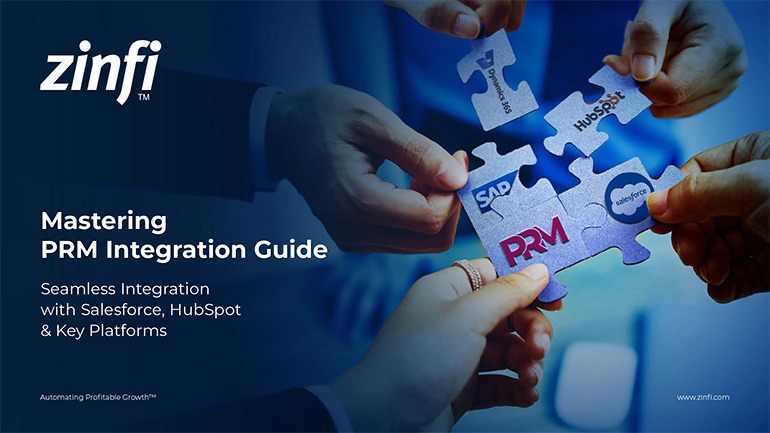Glossary - How to - PRM for Channel Marketing
How to Implement PRM for Channel Marketing?
Introduction
Understanding PRM for Channel Marketing
Partner Relationship Management (PRM) for channel marketing is a strategic approach that leverages technology to enhance collaboration between vendors and their channel partners. PRM platforms help businesses streamline partner onboarding, engagement, training, performance tracking, and marketing automation. An efficient PRM system ensures better alignment, communication, and productivity for organizations that rely on indirect sales channels.
PRM software, in the evolving landscape of partner-driven sales, plays a crucial role in enabling businesses to scale effectively. Through automation, self-service portals, and real-time analytics, PRM solutions empower partners with the resources they need to market and sell more effectively. Implementing PRM for channel marketing improves partner engagement and drives higher ROI.
Importance of PRM in Partner Management Automation
Partner management automation enhances efficiency by reducing manual effort, minimizing errors, and ensuring consistent partner communication. PRM solutions provide a centralized platform where vendors can manage partner relationships, track deal registrations, facilitate training, and execute co-branded marketing campaigns seamlessly.
With PRM software, businesses can:
- Improve partner onboarding efficiency
- Strengthen partner engagement through incentives and training
- Enhance marketing collaboration via content syndication and MDF (Market Development Funds) management
- Increase transparency in deal management and performance tracking
- Optimize sales processes through seamless CRM integrations
Key Takeaways:
Automating Partner Onboarding and Training:
Effective partner onboarding is the foundation of a strong channel marketing strategy. PRM solutions streamline onboarding processes by providing self-service portals, automated training modules, and certification programs, ensuring that partners quickly gain the necessary skills and knowledge to sell products efficiently.
Key benefits:
- Faster onboarding process
- Standardized training for all partners
- Certification tracking to ensure compliance
- Reduced Administrative Workload
Enhancing Partner Engagement with Incentives:
Maintaining partner motivation is crucial for long-term success. PRM software includes incentive management tools that allow vendors to create and track rewards programs, rebates, and performance-based bonuses.
Key benefits:
- Improved partner loyalty
- Increased sales through incentives
- Real-time tracking of incentive performance
- Customizable reward structures
Optimizing Co-Branded Marketing Campaigns:
PRM platforms help vendors and partners collaborate on marketing initiatives by providing ready-to-use campaign templates, automated content syndication, and MDF management.
Key benefits:
- Easier access to marketing materials
- Consistent branding across partner campaigns
- Simplified MDF approval and tracking
- Increased lead generation opportunities
Managing Deal Registration and Lead Distribution:
A structured deal registration process prevents channel conflicts and ensures fair lead distribution. PRM software enables real-time deal tracking, automated lead assignment, and performance monitoring.
Key benefits:
- Reduced channel conflicts
- Higher partner trust and engagement
- Improved visibility into the sales pipeline
- Enhanced CRM integration for streamlined sales processes
Tracking Partner Performance and ROI:
Analyzing partner performance is essential for optimizing channel marketing efforts. PRM platforms provide detailed analytics on sales, marketing engagement, and partner success metrics.
Key benefits:
- Data-driven decision-making
- Improved partner segmentation and targeting
- Higher ROI on partner programs
- Real-time performance monitoring
Summary of Key Takeaways:
- PRM solutions streamline partner onboarding and training, ensuring rapid adoption.
- Partner incentives and rewards drive engagement and increase sales.
- Co-branded marketing campaigns help maintain brand consistency and improve lead generation.
- Effective deal registration and lead distribution prevent channel conflicts.
- Partner performance tracking enables data-driven decision-making and maximizes ROI.
Key Examples:
- Automotive Manufacturing: In the automotive industry, PRM platforms help manufacturers collaborate with dealers on marketing initiatives, track sales performance, and manage inventory distribution efficiently.
- Consumer Electronics: PRM solutions support electronics manufacturers in training retailers, managing promotions, and ensuring consistent branding in marketing campaigns.
- Energy Production: Energy companies use PRM to onboard distributors, track renewable energy installations, and ensure compliance with regulatory standards.
- Financial Services: PRM software helps financial institutions manage partnerships with independent agents and streamline compliance training.
- Food and Beverage: Food manufacturers leverage PRM for co-marketing initiatives with distributors and tracking partner sales performance.
- Healthcare Services: Medical device companies use PRM to manage certifications, training, and compliance requirements for resellers.
- Information Technology: IT vendors rely on PRM to support MSPs (Managed Service Providers) and VARs (Value-Added Resellers) with training and deal registration.
- Pharmaceutical Development: Pharmaceutical companies implement PRM to collaborate with distribution partners and ensure regulatory compliance in different markets.
- Retail Industry: Retailers use PRM to manage supplier relationships, track sales promotions, and optimize product distribution.
- Telecommunications: Telecom providers utilize PRM to support reseller partners with lead distribution and marketing automation.
Conclusion:
Implementing PRM for channel marketing is essential for businesses seeking to optimize partner engagement and improve sales performance. By leveraging PRM solutions, organizations can streamline onboarding, enhance marketing collaboration, and maximize ROI on partner programs.
As channel marketing continues to evolve, investing in PRM technology ensures better alignment between vendors and partners, leading to increased revenue and long-term business success.
By following these strategies, businesses can effectively implement PRM for channel marketing, ensuring improved collaboration, streamlined processes, and enhanced profitability.
Associated Keywords:
- Channel Partner Management System
- Partner Marketing Automation
- PRM Software for Sales Growth















